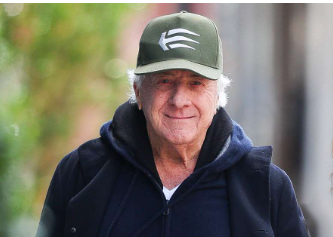Dustin Hoffman’s professional and financial path is remarkably similar to a well-written screenplay, complete with uncertainty, change, and eventual success. No one could have foreseen that his modest $20,000 salary for his role in The Graduate would eventually serve as the foundation for his $100 million fortune. That salary left him with just over $4,000 after taxes. However, his decision to bargain for profit participation instead of pursuing a larger upfront fee turned out to be a particularly creative tactic that changed his financial course.

Hoffman’s wealth increased over the years as a result of both exceptionally successful backend agreements and extremely successful salary negotiations. About $300,000 is still made each year from royalties from The Graduate alone; this amount has significantly increased as digital licensing has grown. This one decision—profit-sharing rather than a one-time payment—shows how foresight can outlast even the most opulent paychecks.
Dustin Hoffman – Profile
| Category | Details |
|---|---|
| Full Name | Dustin Lee Hoffman |
| Nationality | American |
| Occupation | Actor, Director |
| Date of Birth | August 8, 1937 |
| Place of Birth | Los Angeles, California, USA |
| Net Worth | Estimated $100 Million |
| Breakthrough Role | Benjamin Braddock in The Graduate (1967) |
| Academy Awards | 2 (Best Actor – Kramer vs. Kramer 1979, Rain Man 1988) |
| Notable Films | Tootsie, Rain Man, Midnight Cowboy, All the President’s Men |
| Spouse | Lisa Gottsegen (m. 1980), previously married to Anne Byrne |
| Children | Six |
| Reference |
Hoffman’s market value increased dramatically by the 1970s. He made millions of dollars and received praise for movies like Kramer vs. Kramer, All the President’s Men, and Midnight Cowboy. His perceived value to studios rose almost immediately after he won his first Academy Award for Kramer vs. Kramer, enabling him to command salaries ranging from $500,000 to $2 million per project. His ascent reflected Hollywood’s larger shift, where actors were no longer just performers but also sources of income for studios willing to take a chance on their reputations.
The 1980s turned out to be very profitable. Hoffman made $8 million from Tootsie, plus backend profits. However, Rain Man marked the true turning point. Hoffman turned a regular salary into a windfall of over $15 million when the movie made over $350 million worldwide by securing $6 million up front and 15% of net profits. Not only did Hoffman benefit greatly from such deals, but actors like Tom Cruise and Sandra Bullock also used them as a model for similar profit-participation schemes to create long-lasting wealth.
With an average of $3 to $6 million per film, his career earnings in the 1990s and 2000s remained robust. His voice work in Kung Fu Panda opened up new revenue streams, and he received $1 million per episode from HBO’s Luck, demonstrating his continued value in television. His ability to move fluidly between family-friendly films and major dramas was demonstrated by these diverse roles. Hoffman maintained constant bankability after their peak decades, in contrast to many of their peers.
His balanced and restrained personal life is the foundation of his financial success. His second marriage to Lisa Gottsegen in 1980 offered stability and partnership following his first, which was widely reported. They led relatively private lives together, raising six children. At his height, Hoffman made $10 million a film, but he shunned the ostentatious perks of stardom. In contrast to peers who indulged in expansive estates or car fleets, he demonstrated an approach that was surprisingly grounded and affordable by investing rather than flaunting.
Hoffman’s net worth is significant, as the larger industry context makes clear. By demonstrating that backend royalties could be just as valuable as upfront salaries, if not more so, his negotiations foresaw the direction of Hollywood economics. Younger actors like Timothée Chalamet and Zendaya are following in the footsteps of pioneers like Hoffman, who emphasized long-term financial stability over temporary flash, when they think about their contracts today.
His financial story was also shaped by tragedy and personal struggles. He was reminded by the death of his close friend John Cazale in 1978 that having money meant being able to prioritize family and being selective in one’s role, not just accumulating it. Hoffman lost millions of dollars in suspended deals and his professional opportunities were severely curtailed as a result of the #MeToo movement’s accusations against him later in life. Even though he refuted the most serious accusations, the controversy showed how quickly financial prospects can be undermined by reputational harm, even for a legend.
Nevertheless, his financial empire has held up remarkably well. With little active participation, his revenue machine continues to generate millions of dollars a year thanks to the steady stream of royalties from The Graduate, Rain Man, Tootsie, and Kung Fu Panda. It is a highly effective wealth creation model that demonstrates how passive income can maintain financial stability long after peak earnings have faded.
